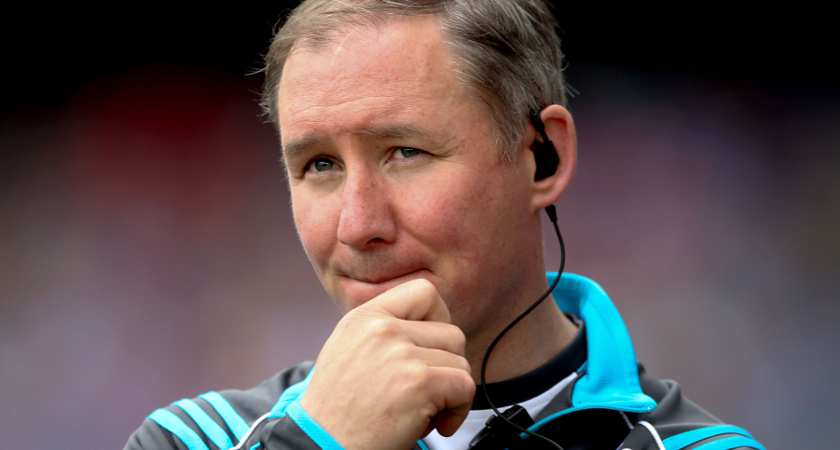IN any amateur sport, money still talks.
And in the GAA, right now, it is talking louder than ever after a week when it was announced that Dublin – the reigning All-Ireland football champions and the 2015 All-Ireland hurling quarter-finalists – received €1.46 million from central GAA funds under the heading, games development.
If that sum doesn't catch your eye, then perhaps this one will. While Dublin topped the funding league table, Laois, the second highest funding recipients, collected just €165,000 from Croke Park. No other counties, by the way, took home more than €100,000.
It’s certainly significant. After coming through a slump, when they failed to win an All-Ireland between 1995 and 2011, Dublin are now set to write their name into Gaelic football folklore. This year they are chasing history, seeking to reach a seventh successive All-Ireland semi-final, a fourth All-Ireland title in six years and a fourth straight League title.
They have won nine of the last 12 competitions they have entered, have lost just once in the Championship under Jim Gavin's tutelage, have won all bar one of the Leinster titles on offer since 2004, and show no sign of stopping or being stopped any day soon.
For not only are they the best team, they are also the best funded, close to €1m arriving into their bank account each year from AIG, the global insurance company, a further €1.46m delivered from Croke Park's coffers, and no one knows precisely how much arrives in from the other 12 commercial partners Dublin are associated with. In contrast, Kerry, regarded as the current secondary heavyweights, brought in €235,000 in total sponsorship in 2014.
![Eamonn Fitzmaurice, left, and Jim Gavin meet again at Croke Park on Sunday [Picture: Inpho]](https://media.irishpost.co.uk/uploads/2015/09/eAMON_fITZMAURUCE_Jim-Gavin_n.jpg) Kerry boss Eamonn Fitzmaurice, left, and Dublin's Jim Gavin [Picture: Inpho]
Kerry boss Eamonn Fitzmaurice, left, and Dublin's Jim Gavin [Picture: Inpho]From 2006, nearly €1m per year arrived via the Irish Sports Council to fund Dublin GAA's grassroots schemes. Not a penny seems to have been wasted, either. Of the 21 players who featured in last year's All-Ireland final, only Stephen Cluxton, Denis Bastick, Alan Brogan and Bernard Brogan pre-dated the development schemes.
"You have to think about what Dublin gives the GAA as well," Andy Kettle, their late chairman, said in 2014. "We bring huge crowds to Croke Park, which generates huge income for the GAA. That money funds lots of projects around the country, not just in Dublin." It certainly does. Counties like Leitrim may not have profited hugely from central funding but did get a large percentage of the pie out of the provincial grants administered by Connacht.
More to the point, clubs within Dublin drum up half the wages – around €19,000 per year – of the development coaches that are employed under the Sports Council scheme. This, clearly, is a hand-up not just a hand-out.
Nonetheless, their rivals are running just to stand still and realistically the majority of counties know they haven't a prayer of usurping Dublin. “Sure look, we can’t compete, it’s as simple as that. If you win a game and face Dublin and lose by 20, that’s all that work undone so what’s the point?” asked the Longford chairman, Brendan Gilmore, last year. The Wicklow chairman, Martin Coleman, went one step further: “Sponsorship alone, we’ve essentially to go out begging, yet they’ll get money coming to them.”
The key thing, is though, that Dublin spend it wisely. Their underage development projects have moulded a more skilful, better coached player. Jim Gavin's backroom team is filled with experts from strength and conditioning gurus through to media consultants. Yet everything they do fits into a structured, well-thought-out plan.

Announced in 2011, the Blue Wave was a document that initially brought scorn, particularly the section entitled: 'key performance targets'. "We want an All-Ireland football title success every three years," it stated. At the time that seemed laughable, given how their 2011 success was their first in 16 years. Now, though, having won three All-Irelands in five seasons, it actually appears conservative in tone. "Aiming to be as successful as Kerry in football and Kilkenny in hurling cannot be considered unrealistic for a county of our scale," said the county's secretary, John Costello.
Costello's own son, Cormac, currently on the senior panel, is among a group of talented young players to come into the set-up in recent seasons with minor and U-21 All-Ireland medals. No wonder then that the likes of Christy Cooney, the former GAA President, and pundits including Colm O'Rourke have called for the county to be split in two.
Should current trends continue, those voices could get louder. For not only are Dublin talented, they are also mentally resilient: think back to last year's semi-final replay against Mayo, when their late charge saw them overturn a four-point deficit to win. Remember too the 2013 final against Tyrone? Or how about the 2015 semi-final against Monaghan?
In the Championship, the 2011 and 2013 final wins over Kerry and Mayo and 2013 semi-final win against Kerry also highlighted their ability to grind out a win which contrasted to what happened from 2002 through to 2010 when they failed to win one single All-Ireland semi-final.
Yet they can be beaten. Longford got one over them in the O'Byrne Cup last month; Donegal beat them in the 2014 Championship. Only Tipperary, Clare or Cork interrupt Kilkenny's hurling dominance every now and then, but Dublin appear to be in the middle of an era of success that won't end for a decade, maybe more.
Not when their balance sheet is even more impressive than their team sheet.

